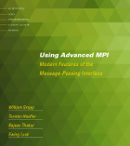Home
Publications
Awards
Research
NB Collectives
MPI Topologies
MPI Datatypes
DDTBench
Netgauge
Network Topologies
Ethernet BTL eth
ORCS
DFSSSP
Older Projects
cDAG
LogGOPSim
CoMPIler
Teaching
Miscellaneous
Full CV [pdf]


Events





Past Events






|
MPI Derived Datatype (Benchmark) Page
Description
This page intends to advocate the use of MPI Derived Datatypes (DDT). DDTs
are a very powerful mechanism to declare data access patterns to the MPI
library which, in turn, can choose the best method for sending or receiving
the structure. This mechanism is superior to manually packing and unpacking
the data. However, early implementations have been suboptimal (and some
still are) such that many users live with the assumption that DDTs are
not useful.
On this page, I present several examples where DDTs improved the performance
of parallel codes. The paper also presents negative examples, however, the
benchmarks are available here such that vendors can go ahead and optimize
for the expected case. Also, datatypes are complete in that one can express
any arbitrary permutation. This means that the potential optimization space
is very huge (combinatorial). One observation is that only some patterns
are common to most applications. The provided application benchmarks on this
page try to provide such patterns to implementers and thus steer the
optimization in a useful direction.
Datatype Application Benchmarks
This page hosts two benchmarks for MPI datatypes. The first one is a
simple parallel two-dimensional Fast Fourier Transformation (FFT) using
FFTW in a 1-d decomposition. The second benchmark is a full application
code (MIMD
Lattice Computation, MILC) acting on a four-dimensional matrix. See
README and LICENSE files in the top directory of both packages for
details.
Download
Datatyped Applications
Robert Gerstenberger extended three applications to use datatypes during
his stay at NCSA. The results can be found below:
Download
The results have been summarized in the datatype microbenchmark DDTBench and the publication [3].
Semi-Automatic Datatype Generation
Marc Snir and Torsten Hoefler co-advised Fredrik Kjolstad's Master's
work on automatic datatype extraction from source codes using
refactoring techniques. Fredrik's webpage
has additional details.
Fredrik converted the NAS parallel benchmarks version 3.2 (Fortran)
packing loops to straight-forward C loop code and applied his tool to
convert the C loops to MPI datatypes. The patches can be downloaded
from his webpage and is mirrored here
nas-datatype-patches.tgz - (59.87 kb).
References
| EuroMPI'12 | [3] Timo Schneider, Robert Gerstenberger, Torsten Hoefler: | | | Micro-Applications for Communication Data Access Patterns and MPI Datatypes Vol 7490, In Recent Advances in the Message Passing Interface - 19th European MPI Users' Group Meeting, EuroMPI 2012, Vienna, Austria, September 23-26, 2012. Proceedings, presented in Vienna, Austria, pages 121-131, Springer, ISBN: 978-3-642-33517-4, Sep. 2012, Invited to a journal special issue on top picks from EuroMPI'12.   |
| EuroMPI'11 | [2] William Gropp, Torsten Hoefler, Rajeev Thakur and Jesper Larsson Träff: | | | Performance Expectations and Guidelines for MPI Derived Datatypes Vol 6960, In Recent Advances in the Message Passing Interface (EuroMPI'11), presented in Santorini, Greece, pages 150-159, Springer, ISBN: 978-3-642-24448-3, Sep. 2011,   |
|















